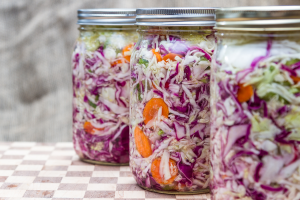These foods, enjoyed across the world and throughout history, deliver a range of benefits and are considered to be an effective way to introduce friendly bacteria to the bowel without taking supplements.
They are also a source of nutrients, as well as helping to draw toxins and heavy metals from the body. They can be thought of as functional food, which means that they promote health and aid bodily functions beyond basic nutrition when consumed on a regular basis.
Fermented foods have been subjected to a process called lacto fermentation. This means that natural bacteria feed on any sugar and starch within a food creating lactic acid. This process is considered beneficial to health because it not only preserves the food naturally without the need for refrigeration, but it also produces probiotics, enzymes, vitamins and fatty acids.
Although fermented foods are considered a specialist food these days, they have in fact been enjoyed by traditional cultures around the world for many generations. Fermented foods used to be a popular addition to our diet, and in fact in some countries they remain so, such as Sauerkraut in Germany and Kimchi in Korea.
Fermented foods are an effective way to introduce friendly bacteria to the bowel without taking supplements
With the arrival of refrigeration, processed and packaged foods, plus the ability to preserve foods in less natural ways such as pasteurization, the art of fermentation has been largely forgotten in many parts of the western world, although now it seems they are making something of a come back thanks to our understanding of their remarkable health benefits.
The benefits of eating fermented foods

Bacteria and enzymes in the fermented foods help us to absorb the nutrients from our food more effectively
Fermented foods truly are super foods when it comes to digestion function. They introduce healthy, probiotic bacteria into the digestive system, which helps to bring better balance of bacteria within the large intestine. We know that having better bacterial balance not only promotes healthier, happier digestive function, but also boosts immunity, reduces inflammation, and even helps us to feel happier and lose weight.
The bacteria and enzymes in the fermented foods help us to absorb the nutrients from our food more effectively too, meaning we benefit more from the food we eat and may be less reliant on nutritional supplements.
Fermented foods are also naturally preserved which means that compared to their non-fermented alternatives, they keep for much longer, sometimes months, without nutrient loss making them convenient and cost effective.
| Popular types of fermented foods |
|---|
| Sauerkraut – a fermented cabbage originating from Germany. |
| Kimchi – a spicy Korean dish made with fermented cabbage. |
| Beet Kvass – a fermented drink made from beetroot that is sour, salty and earthy in flavour. Thought to be beneficial to liver health as well as digestion. |
| Miso – a paste made from fermented soya beans, delivering minerals as well as beneficial microorganisms |
| Kefir – a probiotic milk drink, made by adding kefir grains to milk. Available as coconut kefir (Rhythm Health) as well for those who don’t tolerate dairy. |
| Yoghurt – whether dairy or coconut (such as Coyo yoghurt), live yoghurt offers a convenient way to benefit from fermented foods. |
| Kombucha – a fizzy, fermented tea. |
Fermented foods can be easily and cheaply made at home, many recipes can be found online or in books such as Nourishing Traditions by Sally Fallon; Wild Fermentation by Sandor Ellix Katz; or Real Food Fermentation by Alex Lewin. But if you don’t have time and still want to enjoy them, you can find many fermented foods in your local health food shop or from online retailers such as Planet Organic
Start with small quantities to allow your digestion to adjust, and build up gradually so you are eating two to three servings every day.




